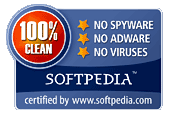|
Everything you always wanted to put in an environment variable
but were afraid to ask DOS, Windows, NT or OS/2 for . . .
Contents
|
Subscribe to XSET mailing list!
This list is used to advertise new versions or tips.
|
- XSET : The easy way to write efficient batch files.
- XSET allows you to put EVERYTHING you want in a variable of the current DOS, Windows,
Windows 95, Windows 98, Windows NT, Windows 2000, Windows XP or OS/2 environment
and use it as if you had assigned it the value with the standard command SET.
You will be able to write very efficient batch files including string
manipulation, calculation, ...
- XSET is the most powerful
environment variable manipulation program you have ever seen.
It also has a very easy and intuitive user interface (very close
to the SET command) - you only need to use the functionality
you need, you do not have to worry about the functionality you
do not use. It is not a resident program; so it will not interfere
with any of your other applications.
- XSET is fully compatible
with MS-DOS (from 3.30), DR-DOS, NDOS, 4DOS, OS/2, all Windows.
- XSET is a shareware
program. Just try it for free (this is a full-featured version
- no limitation) and register if you like it. Otherwise, just
delete it.
- XSET is now a best-sellers since 1990 and is used by several thousand companies
and private users around the world.
XSET was designed
to be usable by a novice user, thanks to its intuitive
and progressive user interface, but was mainly
developed to help system/network administrators to establish logon
or backup procedures or professional programmers to automate the
tasks they encounter each day.
XSET main goal is
productivity. It lets
you write full-featured batch files in just a few minutes. You
do not have to learn a new language or environment, you just call
XSET when you need
it in your usual batch files.
- Catch the output of any command (internal or external) or
program and put it into an environment variable
- Manages variable contents of more than 128 characters (your
path can now be as long as you want)
- Built-in commands to modify the output of a program or a string
given on the command-line (extract a part of a string, ...)
- Built-in full floating-point calculation functionality: You
can program incremental loops, input a calculation string and
output the resulting number, ...
- Built-in commands to give you access to a lot of system data
(date, time, file attributes, CPU type,...)
- Built-in commands to clear the whole environment or restore
a previously saved one
- High-level input/output user interface (line-editing, colors,
windows, boxes, ...)
|



